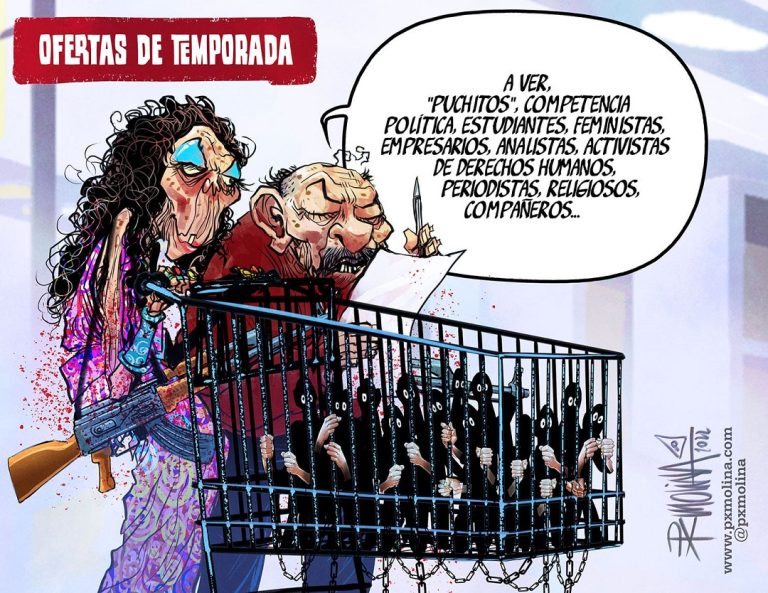6 de abril 2023

The Return of the Military

PUBLICIDAD 1M
PUBLICIDAD 4D
PUBLICIDAD 5D
Ethnic cleansing only benefits the Ortega clan and its dynastic project, a vehicle of accumulation of political power and wealth

Since it was coined during the Balkan war in the 1990s, the term ethnic cleansing has been experiencing expansions to include adjoining phenomena that do not necessarily involve the cleansing of one ethnic group to the detriment of another considered an enemy or of a lesser category. Hence, conflicts of social suppression also have been included for economic, political, and ideological reasons.
The repression of the Ortega dictatorship, according to the patterns recently denounced by the report of the Group of Human Rights Experts on Nicaragua (GHREN), is comparable to cases of social annihilation practiced in other conflicts. The massive and systematic violation of all possible human rights proves a strong willingness to exterminate the people that the Ortega regime considers the enemy.
Among those who have expanded the margins of the term is the Mexican anthropologist Rodolfo Stavenhagen, for whom ethnic cleansing consists of “the expulsion from a territory of an ‘undesirable’ population, based on religious, political or ethnic discrimination; or on the basis of ideological or strategic considerations; or rather from a combination of these elements.”
Applied to the Nicaraguan crisis, this definition allows us to confirm that what began as a protest against social security austerity reforms, and which led to a typical conflict over social reproduction, has scaled to such a degree that there is no doubt that we are facing the implementation of a policy of elimination of an important part of the Nicaraguan population by all possible means, including assassination for ideological reasons. Stavenhagen calls this simply politicide, when the aim is to exterminate all vestiges of ideas and people who defy oppressive power.
The impunity in which most murders, injuries by firearms and tortures remain, conveys the message of the disposable condition in which all people whom the dictatorship considers or might consider undesirables find themselves for not yielding to the official creed. Without rights or protection institutions, being undesirable under a dictatorship is equivalent to being a disposable subject, who can be eliminated, pushed into exile or banished without major consequences. No one escapes from this condition, not even those who silently supported by omission the repressive acts, nor those who joined the paramilitary ranks and shot at the protestors. It is impunity as a measure of discrimination.
But if you wanted to follow the trail of ethnocide one needs to look no further than the periodic campaigns against the native people of the Caribbean Coast. With a purpose more economic than cultural, since his return to power Ortega has sponsored the expansion of armed settlers who have perpetrated repeated massacres against the inhabitants of the Caribbean regions with the goal of appropriating their lands and forests. In those remote places took place the rehearsal of purge that the dictatorship would later practice at a larger scale against those who oppose its plans. It is the expulsion from the territory to make space for exploitation without boundaries.
Forced exiled has been the largest ethnic (and political) cleansing operation undertaken by any of the dictatorships that Nicaragua has suffered in peacetime. According to different sources, since 2018, between 250,000 and 300,000 Nicaraguans have been forced to go into exile fleeing from Ortega’s repression. An equivalent of 5% of the population has not left the country because of a sudden fondness for tourism. They went abroad pushed by the repressive actions of the regime, by police harassment, by paramilitary pressures, by obstruction from the bureaucracy and all forms of coercion deployed to make life impossible for those whom the propaganda had previously labeled as disposable, as non-persons who did not deserve to live in the land where they had grown roots. It is exile as the displacement for national cleansing.
In the same way as other ethnic cleansings, Ortega’s has also included segregation for religious reasons. In its crusade against the Catholic Church, the regime has not spared any of its weapons: it has burned one of the most venerated images in the country, occupied the main Cathedral with its fanatics, put priests and a bishop in prison, and lastly has banned processions and Stations of the Cross on the eve of Holy Week. Someone has said that Ortega, like Henry VIII, pretends to create a Church at whose head he places himself, and perhaps he is not mistaken. It is religious discrimination as the imprint of cultural abolishment.
But if something remains of the relationship between the will of extermination and the policy of ethnic cleansing, it is in the banishment issued against prisoners of conscience. It was a measure that had been practiced in silence against people who were not allowed to return to the country, or against musicians who dared to sing at the protests of 2018. Massively expelling “undesirables” from their own country for political reasons is a measure inscribed in the handbook of tyrants. It is expulsion as a tool of ethnic cleansing.
The complement to the aforementioned has been the stripping of the nationality and the assets from those considered undesirable, impure or traitors. In violation of national and international laws, the tyranny lowered its thumb so that its henchmen could execute the order to annul, destroy, exterminate all those bad people who were keeping the dictator awake at night. But he did not stop there either. Overwhelmed by his own rage, since he could not eliminate us physically, he ordered civil death: to erase the civil registrar, erasing them from the map as if by doing so he could erase them from collective memory. It is suppression from the root to leave no trace of the lives of these people. It is ethnic cleansing taken to paroxysm, delirium unleashed by dictators to erase the past, present and future life of their enemies: to turn them finally into non-persons.
Who benefits from this ethnic cleansing implemented in Nicaragua? In contrast to what happened in other conflicts there is no ethnic group interested in slaughtering opponents. So, who benefits? Does it benefit FSLN members, many of whom have relatives harmed by the purges? Perhaps it benefits the paramilitaries who, as already seen among the exiles, are also disposable material? Or maybe public officials, pieces in the repressive machine and at the same time prey of fear?
To put it in anthropological terms, ethnic cleansing only benefits the Ortega clan and its dynastic project, the family that has become the axis of accumulation of political power and wealth. Neither the party that no longer exists, nor the State that does not exist either; only the Ortega family will be the recipient of the great national cleansing, of the disappearance of critical voices and people that threaten its survival.
The Ortega family is the only entity that fears everything, social change and processions, freedom of speech and intramural prayers. But those who fear the Stations of the Cross will turn their lives into a nightmare.
This article was originally published in Spanish in Confidencial and translated by Havana Times

PUBLICIDAD 3M
Politólogo y sociólogo nicaragüense, viviendo en España. Es municipalista e investigador en temas relacionados con participación ciudadana y sociedad civil.
PUBLICIDAD 3D